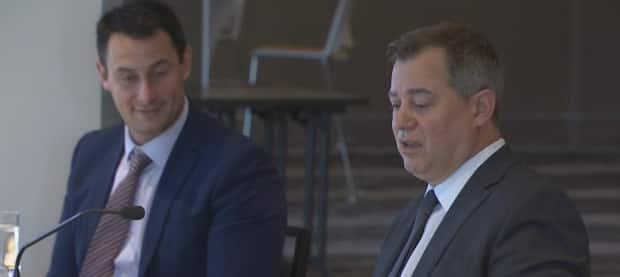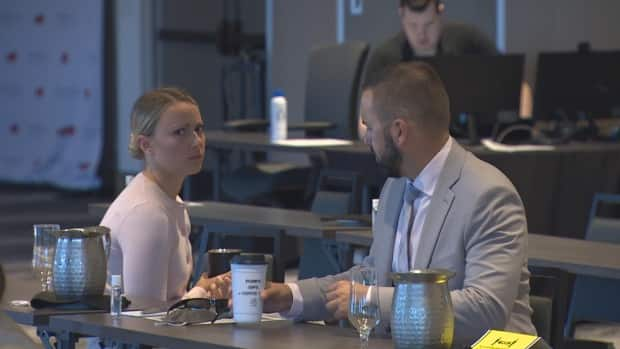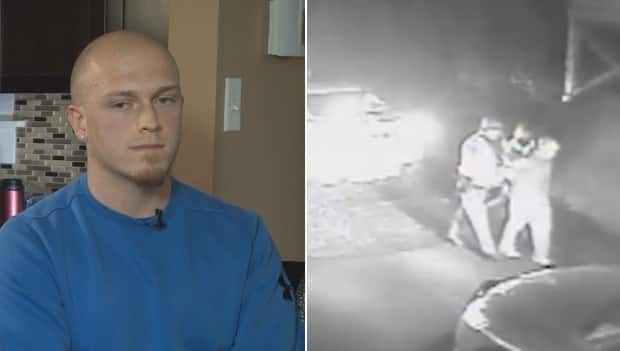Disciplining RNC officers accused of unlawful arrest could set dangerous precedent, lawyer argues

The lawyers for two Royal Newfoundland Constabulary officers accused of unlawful arrest and use of excessive force argued Friday that both constables were in the right, and to say otherwise could set a dangerous precedent for public safety.
The Ontario Provincial Police investigated the two constables under scrutiny, Isabella Wagner and Bernard Morgan, after a father and son complained about being pepper sprayed and hit in the head during an arrest in 2017.
Wagner also broke a glass patio door in the family's home to gain entry.
Dennis and Zackary Ball spoke to CBC News shortly after the incident and provided home security and dashcam video of the alleged assault.
They also submitted a public complaint against the arresting officers, leading to the investigation and this week's disciplinary hearing.
Wagner's lawyer, Stephen Orr, told the hearing in his final submission Friday that Wagner did little more than follow directions from a senior officer on the scene.

Had she not broken the Balls' window, Orr argued, Zackary — already "doing the UFC thing, posturing" and "being aggressive" — may conceivably have run out of the house with a knife, hurting himself or police.
Disciplining the officers for making a quick arrest through the means available to them could set a dangerous precedent, he continued, making it harder for RNC officers to prevent potential violence.
Lawyer Mark Murray, representing the RNC's public complaints commission, disagreed.
There has to be an analysis finding the possibility of bodily harm in order for a police officer to enter a dwelling without a warrant, Murray argued.
He said he could see no evidence the two constables made such an analysis or that Zackary was a threat to himself or others.
No criminal charges
Murray also pointed to several inconsistencies in Wagner's testimony compared with video evidence and a previous statement.
Family member Kimberly Ball, also present that day, complained Wagner was rude to her and swore at her. She also alleged Wagner made inappropriate comments about Dennis Ball's mental health, Murray said.
"That kind of editorializing commentary is not helpful at all to the situation," Murray said.

"I'm not sure it's ever appropriate to swear at a member of the public … even when a member of the public is swearing at you. They're not getting paid to police within the city."
Murray said he found Kimberly Ball's testimony "entirely truthful."
Force must be necessary: commission
Zackary Ball, who Morgan struck in the back of the head as he walked him to the patrol car in handcuffs, could have turned around to spit or headbutt Morgan, the officer's lawyer argued.
"He was a threat to them and he could have done either of those things," said Ken Mahoney, and applying force to the back of Zackary's head constituted "reasonable" prevention.
Morgan called for an ambulance once Zackary was detained in the patrol car, he continued, and gave him a saline solution to neutralize the pepper spray. He also rolled down the window for ventilation, the lawyer said, showing concern for his well-being.

But RNC policy doesn't refer to "reasonable" use of force, Murray rebutted, pointing out that any force applied to a person must be considered a requirement for control and public safety.
"I don't think you can say … 'based on my training, what I did was reasonable,'" said Murray, adding that officers need to determine it was necessary.
"I don't think you get to strike because this 'may' have happened."
Transparency an urgent concern
The OPP investigation, overseen by independent lawyer Gus Bruce, recommended criminal charges for both Morgan and Wagner. Former Crown prosecutor Iain Hollett declined to pursue the case, however.
An RNC disciplinary hearing cannot result in a criminal conviction, and disciplinary matters within the RNC are generally handled internally and are not open to the media or public.
Lawyer Wendy Zdebiak, speaking on behalf of RNC Chief Joe Boland, spoke at length following final submissions about increasing transparency within the RNC, calling the public complains process a "first step."
"This is an opportunity for you … to make recommendations in the public interest," she told adjudicator Andrew Wadden.
"The public needs to know the facts when they're talking about police accountability."
Wadden has three months to return a verdict, based on a balance of probabilities. He could not say when he would reach a decision.

